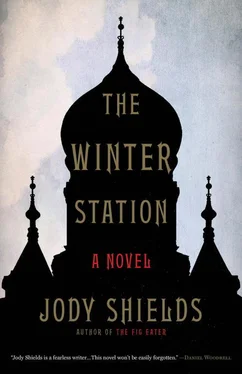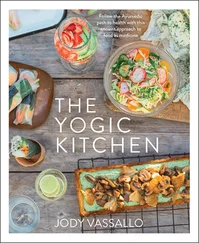Within minutes after she became chilled and her pulse raced, Dr. Maria Lebedev was swathed in blankets. By evening, her temperature rose and her face flooded with color as if she blushed. Her hand found Messonier’s hand. A sentinel at her bedside, he had stripped off his rubber gloves, unable to bear their thick clumsiness, the barrier to her skin. His mask, forgotten, dangled around his neck. When Maria slept and he could slip out, he wept in the next room, away from her eyes and ears. His anger was more difficult to hide because it made him reckless. Messonier had poured a bottle of her perfume, Jicky, all around the room, on the floor, pillow, and bed linens, to hide the odor of disinfectant. Maria was still lucid. She murmured a request to be taken to St. Nikolas Cathedral.
No, no, no . Messonier slid to the floor next to the bed, gripping the linen sheet as if to wring the fever from her body.
It seemed cruel to expose Maria to the cold, but he followed her wish. Messonier hired a sleigh and made a nest for her, a thickly swaddled figure, unrecognizable in blankets and furs in the back of the sleigh. It was a slow, halting procession to the church as the road was rough with ice under fresh snow.
The side door of St. Nikolas Cathedral had been left unlocked. The Baron and Messonier carried Maria on a stretcher into the building, followed by Li Ju and Chang.
It was only slightly warmer inside the church, faintly lit by the wavering pinpoints of candles on the altar. An odor of burning wax, the pressure of deep cold against wood. Maria was gently maneuvered to face the iconostasis, the royal gates, the towering gold screens hung with icons, that hid the altar. The gates had been specially opened for the service of extreme unction. The ceremony was usually performed by seven priests representing the seven churches, but only four men had been found at short notice. Each priest covered his mouth and nose with a protective mask.
They were uncertain if she was aware of her surroundings. “We’re in the church now, Maria. All of us.” Messonier’s whisper echoed in the space. He caressed her shoulder through the thick blankets.
The fine cloth placed over the lower half of Maria’s face rose and fell with her labored breathing. She had insisted on this caution for the others. Messonier, Chang, the Baron, and his wife stood behind Maria, as if her stretcher were a raft that they would help guide.
A priest paced around them, swinging a censer back and forth on clanking long chains, leaving a zigzag trail of incense, gray against the dim light. The candles held by the witnesses flickered as the priest’s full robes stirred the air.
In silence, Archpriest Orchinkin placed a dish of dry grain, symbolizing death and resurrection, on a small table covered with a white cloth before the royal gates. In memory of the Good Samaritan, a glass of oil and wine was set in the center of the dish. Tiny wooden sticks, their tips wrapped with cotton wool, were inserted in the dry grain and stood upright around the glass.
The priest read from James, chapter 5:
Is any sick among you? Let him call for the elders of the church; and let them pray over him, anointing him with oil in the name of the Lord.
Archpriest Orchinkin raised his voice over Maria’s coughing as he read the psalms, litany, and prayers of benediction. He dipped a stick in the oil and made the sign of the cross on Maria’s forehead, cheeks, nose, lips, and breast and over her folded hands. Her chest heaved with coughing and Messonier tenderly dabbed bloody foam from her mouth and face with gauze until she was quiet. The four priests surrounded Maria, one by one anointing her with oil as the Seven Epistles and Gospels for Unction from Romans, chapter 15, were read.
The mind governed by the flesh is death, but the mind governed by the spirit is life and peace.
Maria groaned softly. She clawed at the blanket around her shoulders and struggled to free herself. The Baron secured the mask over his face and helped Messonier lift her into a slightly inclined position on the pillow. Messonier held her shaking hand, making the sign of the cross. He nodded at the Baron, who placed something in Messonier’s outstretched hand. A shine of gold as Messonier slipped the ring on Maria’s finger and closed his hand over hers. She recognized his gift and her fingers moved, responding to his touch. The back of Messonier’s hand was wet with tears.
Each priest grasped a corner of the Book of the Holy Gospel and held it open over Maria’s head as they prayed.
You, however, are not in the realm of the flesh but are in the realm of the Spirit.
Messonier tenderly adjusted the pillow behind her back. Her coughing was louder, deeper, racking her body with spasms. Blood flecked the pages of the Bible above her. They waited.
“I ask for the priest’s blessing.” Maria’s words were torn by her gasping for breath.
Archpriest Orchinkin blessed her.
“I ask for everyone’s forgiveness.” Her voice was stronger now.
Everyone murmured consent for forgiveness.
Her eyes flickered with weariness and found Messonier. He bent to kiss her forehead, but with a flash of gold, her hand fluttered to stop him.
The space across Maria Lebedev’s grave was narrow, but the snow flew with such force—furious white sparks—that the mourners were visible only as faint featureless outlines to one another. In voluminous layered robes, so heavy the wind barely disturbed them, the priest swept his arm over the grave and poured oil and ashes of incense reserved from the service of extreme unction.
Rest with the saints, O Christ, thy servant’s soul, where there is no pain, nor grief, nor sighing, but life that endeth not.
The beggars standing behind the mourners loudly wailed and wept, a ritual performance for which they were paid.
It was nine days after Maria Lebedev’s death. Traditionally, a second remembrance ceremony would be held twenty days after her death and a third ceremony at forty days.
The feast of remembrance for Maria Lebedev was held in Novy Gorod at the home of Dr. Iasienski, head of the Russian hospital. Members of the medical staff were present and guests wore gloves and cotton masks or held handkerchiefs over their noses. Physical contact was strictly avoided. People stood apart from each other during conversation and the distance made them more animated, their voices louder. Because of the fear of infection, all interior doors were propped open to allow free circulation of air.
The sideboard was laid with small plates of zakuski, smoked fish, meats, and many types of vodka, each bottle wrapped with a napkin. To pour a drink, guests placed a fresh napkin over the bottle to avoid touching it directly.
Through the open door to the kitchen, the Baron recognized a familiar figure. Chang stood on a chair leaning over the table, hands deep in a bowl. Sensitive to observation, he turned and beckoned the Baron into the room.
“They practically boiled my skin before I was hired to cook.” Chang’s voice a hoarse whisper. “The women in the house inspected me. Boychick, they called me. I had to unbutton my shirt so they could see I didn’t carry infection.” He grinned, reacting to the Baron’s expression. “No, no. They just wanted to look. I didn’t mind. Wasn’t the first time. Hand me the knife. Put your gloves on first.” He carefully spooned caviar into a hole in the center of a pie crust. “Caviar is the surprise garnish in the fish pie.”
“Rastegay.”
“Ah, you like it? An extra serving for you. There’s also selianka with sterlet and sturgeon. Pickled tomatoes, mushrooms, and pumpkin. Beets and bog berries boiled with cinnamon and cloves. Pokhobka , potato soup. It was hard work to get the ingredients. Provisions aren’t delivered. You can’t buy anything. There’s nothing in the market but fear of plague. You wonder about my cooking skills? I was a kitchen apprentice years ago. Russian cooking is a challenge, although Chinese food is more complex.”
Читать дальше











